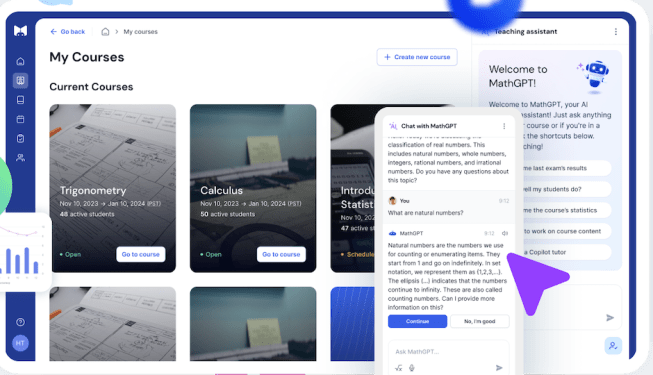As artificial intelligence becomes more common in classrooms, students are using it to complete assignments while teachers grapple with how to manage its use. In response to this challenge, an AI platform named MathGPT launched last year. It aims to serve as an anti-cheating tutor for college students and a teaching assistant for professors.
After a successful pilot program at thirty colleges and universities across the United States, MathGPT is preparing to nearly double its availability this fall. Hundreds of instructors plan to incorporate the tool into their courses. Participating schools include Penn State University, Tufts University, Liberty University, and others.
A key feature of the platform is that its AI chatbot is designed to never give direct answers. Instead, it uses a method known as Socratic questioning, asking students questions and providing support to guide their learning. This approach functions like a human tutor, encouraging critical thinking over simple memorization.
For instructors, MathGPT acts as a teaching assistant. It can generate questions and assignments based on uploaded textbooks and learning materials. The platform also offers auto-grading and other AI-powered features. It supports college-level mathematics, including Algebra, Calculus, and Trigonometry.
Along with its expansion, MathGPT has launched an upgraded platform with new features that give professors greater control over student usage. The platform is distinguished by its instructor-centric approach. For instance, instructors can now decide when students are permitted to interact with the chatbot. They can specify if the AI should provide tutoring support for certain assignments while requiring independent work on others.
Another new feature allows professors to set the number of attempts a student has to answer a question correctly. To foster a low-pressure learning environment, MathGPT also offers students unlimited practice questions that do not affect their scores, allowing them to test their knowledge without grade-related stress.
Additional features for instructors include an optional requirement for students to upload images of their work. This allows professors to review submissions and verify the authenticity of the student’s effort. Other recent updates include integrations with the three major Learning Management Systems: Canvas, Blackboard, and Brightspace.
The platform has also improved its accessibility by adding screen reader compatibility and an audio mode. It already provides closed captions for its AI-narrated video lessons, which are designed to sound like historical figures such as Ben Franklin and Albert Einstein. The company states it complies with the Americans with Disabilities Act.
While other AI chatbots have faced criticism for inappropriate interactions with young users, MathGPT states it has strict guardrails to ensure a safe learning environment. The chairman of MathGPT, Peter Relan, emphasized that the chatbot will not engage in personal conversations about relationships or the meaning of life. Its purpose is strictly educational.
It is important to note that, like any AI, MathGPT has the potential to produce inaccurate information. The chatbot includes a disclosure warning users that it may make mistakes. Users can report any errors they find to the company. Relan noted that the number of such inaccuracies has been extremely low and continues to decline, citing a team of human annotators who review all content to ensure one hundred percent accuracy. The company even offers gift cards to users who report confirmed errors.
For future growth, the company plans to develop a mobile app and expand into more subjects like chemistry, economics, and accounting. MathGPT offers a free option, as well as a paid version costing twenty-five dollars per student per course. The paid option includes benefits such as unlimited AI assignments and full integration with Learning Management Systems.

